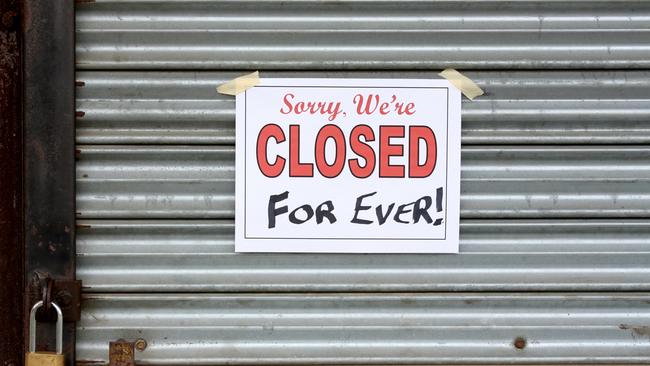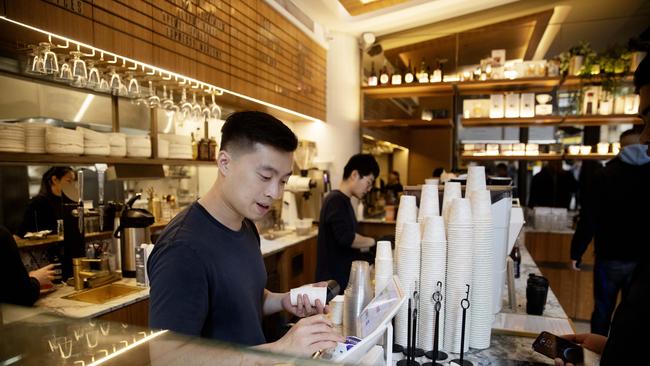Business payment defaults are at a record high and it’s hospitality that’s worst hit
Business payments defaults are at a record high and credit reporting bureau CreditorWatch says a ‘perfect storm’ of conditions is on the way for the hospitality sector.

The food and beverage services sector continues to be the largest casualty of the economic slowdown as business payment defaults soar to record levels, according to CreditorWatch.
The credit reporting bureau’s latest Business Risk Index (BRI) revealed that the failure rate for Australian businesses currently sits at an average of 4.95 per cent – an increase of 17.3 per cent since January. CreditorWatch forecasts that the rate will increase to 5.2 per cent over the next 12 months, driven by low levels of consumer spending, high inflation and interest rate increases
The forecast comes ahead of the release of the Australian Bureau of Statistics’ labour force survey on Thursday which will give a further indication of the direction of the Australian economy over the next few months.
CreditorWatch chief executive Patrick Coghlan said the rising business failure rate showed how urgently businesses needed interest rate relief.
“One of the biggest contributing factors to this increase in our business failure rate is the lack of consumer demand,” he said.
“This is reflected in the ABS household spending and Westpac Consumer Sentiment numbers.
“Consumers won’t be inclined to open their wallets in any significant way until they get a reduction in their mortgage payments. A couple of rate cuts would also mean that credit becomes more affordable for businesses, and they are able to get back on the growth track as well.”

The increase in the business failure rate was reflected in CreditorWatch’s data on business payment defaults, which have leapt 68.1 per cent in the past year and are now at record levels, indicating that an increasing number of businesses were unable to pay their invoices from suppliers.
CreditorWatch has identified a strong correlation between business-to-business payment defaults and business failures in the ensuing 12 months. A business with one default has a 28 per cent likelihood of closing within the next 12 months, rising to 74 per cent for four or more payment defaults.
According to the BRI, food and beverage services has the highest rate of business failures among all industries, recording a rate of 8.2 per cent for August – or one of every 12 business – followed by administrative and support services at 5.8 per cent.
At the other end of the scale agriculture, forestry and fishing recorded a rate of just 3.3 per cent.
The food and beverage sector, in particular, was facing a “perfect storm” of rising costs even as demand declined. At the same time, the Australian Taxation Office was actively chasing debts.
And in almost all instances, businesses in the food and beverage sector pay rent on retail space which is typically located in high-foot-traffic retail precincts.
Other data found by CreditorWatch includes court actions – backed by large creditors such as the major banks and the ATO – were up 15.4 per cent in August year on year, while credit inquiries were largely flat across 2024, reflecting the subdued trading conditions in the economy.

Food and beverage services was the leading industry for outstanding ATO tax debts above $100,000, with a rate of 1.73 per cent. Construction was next on the list at 1.2 per cent, followed by the transport, postal and warehousing sector at 0.89 per cent.
Overall, Perth had the lowest rate of business failures among the capital city CBDs (4.08 per cent), followed by Adelaide (4.14 per cent), Melbourne (4.57 per cent), Brisbane (4.72 per cent) and Sydney (5.23 per cent).
CreditorWatch chief economist Anneke Thompson said Thursday’s labour force data would give an indication on the immediate future of the Australian economy.
“Our data, consistently and for some time now, indicates that Australian businesses are operating under extremely challenging conditions – particularly those in the food and beverage, arts and recreation, retail trade and construction sectors,” she said.
“Under these circumstances, it is almost certain that unemployment will continue to rise – the question is by how much? We don’t expect businesses to feel more confident until there have been at least two or three cuts to the cash rate. Unfortunately, this means it is likely things will get worse before they get better.”
Separately, research by funding solutions company OptiPay shows the average days outstanding for business invoices is 38 days but could be in the mid 40 days by December – a level not seen in the past decade.
“This slowdown in payments is having a knock-on effect down the whole supply chain across just about all industries. It’s a sign businesses are under mounting financial strain and are starting to become selective about the timing of when they pay invoices,” OptiPay chief executive Angus Sedgwick said.
“With the ATO coming down hard on tax debts, many businesses which have previously weathered the past couple of years are suddenly realising their cashflow options are now limited.
“With higher interest rates, banks are tightening their lending; so unfortunately pain is on the way for many SMEs who are struggling with cashflow as invoices are not paid on time.”




To join the conversation, please log in. Don't have an account? Register
Join the conversation, you are commenting as Logout